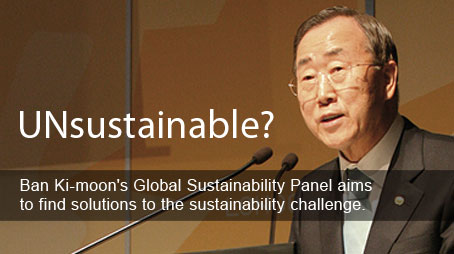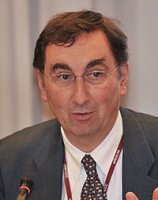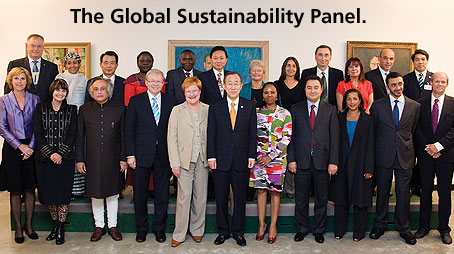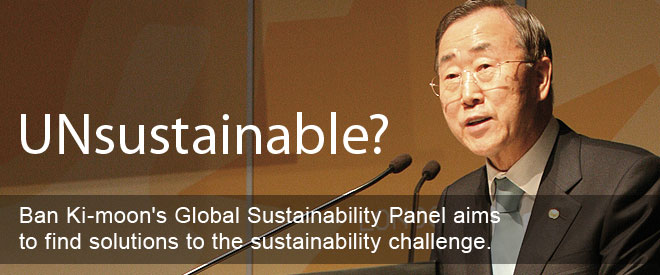| SEARCH |
-

Nov 17, 2015
Reflections on a three-decade legacy
The International Geosphere-Biosphere Programme (IGBP) will come to a close at t...
-
Nov 17, 2015
Use of and access to content on this website
Text and images produced by IGBP in house are free to use with appropriate credi...
-
Nov 12, 2015
Bella Gaia performance and panel discussion to mark IGBP's closure
A musical performance by Bella Gaia will celebrate the achievements and legacy o...
-

Towards Future Earth:
evolution or revolution?
During its three decades of existence, the International Geosphere-Biosphere Pro...
-
A personal note on IGBP and the social sciences
Humans are an integral component of the Earth system as conceptualised by IGBP. João Morais recalls key milestones in IGBP’s engagement with the social sciences and offers some words of advice for Future Earth.
-
IGBP and Earth observation:
a co-evolution
The iconic images of Earth beamed back by the earliest spacecraft helped to galvanise interest in our planet’s environment. The subsequent evolution and development of satellites for Earth observation has been intricately linked with that of IGBP and other global-change research programmes, write Jack Kaye and Cat Downy .
-
Deltas at risk
Around 500 million people worldwide live on deltas, but many of the world's deltas are sinking due ...
-
Climate change: the state of the science
A new data visualization released on the first day of the plenary negotiations at the UNFCCC’s clima...
-
Climate Change:
the State of the Science
Videos now online from the Stockholm public forum to mark the launch of the IPCC's climate report, 2...

UNsustainable?
The United Nations has struggled to deliver on many environmental and developmental challenges. Time for new thinking, then, which is why UN Secretary-General Ban Ki-moon has set up the Global Sustainability Panel. But how can science contribute? Owen Gaffney discusses the panel with Janos Pasztor.

Janos Pasztor
Why have you set up the Global Sustainability Panel now?
The panel should have been set up some time ago to be honest. The idea came early last year, initially from the Stockholm Commission on Climate Change and Development report. The report asked the Secretary-General to set up a high-level panel of this nature to bring climate change into the development process. Around the same time many national governments decided to go ahead with the United Nations conference on Sustainable Development in Rio de Janeiro in 2012 (commonly referred to as Rio +20).
The panel took some time to put together. It was more or less ready at the end of last year and our plan was to launch in January right after Copenhagen. Then of course Copenhagen did not turn out how we wanted it, so the Secretary-General was very busy in the follow-up. This included setting up another high-level panel that became the advisory group on climate-change financing. This took away some of our energy. We are now ready. And we have to be ready. We are less than two years away from the Rio 2012 conference, and the panel is set to make an important contribution to it. Rio 2012 is not the only target we have but it is definitely an important target to aim for.
The panel documents say the “panel will seek to explore approaches for building a low-carbon, green and resilient economy that can eradicate poverty.” This is pretty much what was expected from the Rio Earth Summit in 1992. Why do you think this new panel can succeed where others have failed?
We have learned a lot since 1992 on the different aspects of the problem. We know more about both climate change and poverty eradication. I think that we still lack sufficient experience with how to connect the dots, how to bring together concepts like climate change and poverty eradication, climate change and food security, and climate change and access to water. Ultimately, if we do not solve climate change we will not solve food security; yet, we are still treating the two as separate issues. Agriculture is not just a key source of emissions but it is also a key area for adaptation and a more resilient development process. These things are inter-related. The international community, and for that matter national governments, have been unable to address these inter-linkages well enough. This is what our panel will be focusing on.
There is an expectation that a panel like this will try to solve everything in the world. This is not possible. We want to focus on climate change – not in the ‘climate change’ box but in the ‘development’ box. We must connect it to these drivers: poverty reduction, food security and access to water.
So it seems to me that the UN is seeking a more unified, holistic approach to these problems, not just conceptually, but structurally. This is reflected in the panel’s terms of reference which state “we are reaching and increasingly overstepping planetary boundaries,” a reference to Johan Rockström and colleagues’ Nature paper published in 2009. I guess this indicates a strong desire by the UN to link the challenges?
Absolutely, absolutely. This is being done for a number of reasons. First, you cannot solve these problems separately. Second, international institutions – the UN and others – are fragmented. One of the key issues to be discussed in Rio de Janeiro in 2012 is precisely this: how do we improve this situation? How can we improve the linkages between institutions so we can have overarching comprehensive strategies and implementation of these strategies?
The planetary boundaries are linked not just between themselves but to other socio-economic goals and developmental targets.
The planetary boundaries concept was only published in September 2009. Has it had an impact at the high level you are working at within the UN?
Not yet, but that is part of the reason why we have such a panel. These issues are on the table. The Rockström et al. paper is there. It is a very good paper. But it needs to be understood and picked up by the politicians, by the political discourse. We definitely hope that through this panel, which consists of senior politicians of one type or another, those issues will become part of the political discourse.
The International Council for Science (ICSU) is discussing launching a major programme on global sustainability research. In 2011, there will be a Nobel Symposium on sustainability in Stockholm. And, in March 2012, in the run-up to the 2012 Rio conference, the global-change programmes hold a major conference in London on sustainability: Planet Under Pressure. Is there a mechanism for the scientific community to feed into your panel?
Not yet. But there will be. We have just started, literally. I have just hung up the phone on the first meeting with panel members and their advisors. Connecting over 20 places in the world is quite a challenge. The intention is definitely there to engage some of the key constituents, one of which is clearly the scientific community. Whether it will be through setting up working groups or engaging existing processes like ICSU and others on the business side and civic society side, we are not sure yet. We now have a number of thoughts on this. The secretariat will put together some ideas for the first meeting.
I can assure you that the scientific community is a key sector we will be working with. Maybe you have some thoughts on how to go about this? If you have a major meeting in March 2012, the preparatory process that will go into that meeting could be used as an input into the work of the high-level panel.
Maybe, in a more practical way, we can exchange the agendas of the two panels. The scientific panel will have its own work programme and its own agenda. Our high-level panel is about to finalise its own agenda and programme based on its terms of reference. Maybe at a secretariat level we can see how we can put these agendas together and adjust the respective agendas in light of each other. And then have a group of scientists come to the panel and say “here, this is what the scientists think.” I can envisage a number of different ways to make this work.
How were panel members selected?
The Secretary-General wanted to have a good number of top-level existing office-holders. He felt if you have too many ex-ministers and ex-presidents they will have nice ideas but their proposals may no longer be politically feasible or doable. We wanted a certain level of accountability. We can achieve this better by having current officials who have some understanding of these issues and who are struggling with them right now.
I think we have a very good list. I really look forward to working with them. The first phone call we had was fantastic. There is a real willingness to work and to engage. Broadly speaking, there is a shared feeling on how to go about this.
Given the panel is made up of people who are part of the system that is failing to deliver, how can you be sure the ideas generated will deliver? Is there enough out-of-the-box thinking?
This was confirmed by our initial teleconference a few moments ago. Not all the wisdom resides in the members of the panel. They are very good people, but they recognise they do not have all the answers. The conclusion to that is that we will have a very intensive and open process to engage and seek inputs from the key actors in the world so we do get rich inputs, new ideas and out-of-the-box thinking.
The UN was set up to stop wars. Is it really able to deal with planetary environmental issues and to effectively start managing some of Earth’s biogeochemical cycles?
This is not a UN panel even though it was set up by the Secretary-General. It is not about the UN, it is about the world and the role of the UN in that world. Is the UN able to deal with the interconnected global issues like planetary boundaries combined with socio-economic objectives in the world? If it isn’t, then it is no longer relevant. This will be the test that will demonstrate the extent to which the UN can be relevant in the 21st century: can we successfully rise to these challenges?
How did you choose the name, Global Sustainability Panel?
Initially, this was meant to be a high-level panel on climate change and development. But as we started looking at the broader context of development, it was felt that we had to do something much broader. Besides if you put climate change in the title, then no matter what else you put there it will be very much taken over by climate change, and we decided it was more important to look at the broader context. We could have called it “sustainable development” but “sustainability” is shorter and more encompassing.
Gordon Conway, former President of the Rockefeller Foundation and Chief Scientific Advisor to DFID, once said that the number one position on the planet, the Ban Ki-moon position, should not have the title “UN Secretary-General”, but the title, “Planetary Ecologist”. How close to this are we?
Closer than ever before, if I can put it that way. This Secretary-General has had these issues on his radar screen more than any of his predecessors. Of course, he does not have all the means at his disposal to simply deliver on all these issues. But certainly Ban Ki-moon has recognised the incredible importance of climate change as the one underlying issue that affects everything else the UN is doing. We will not be able to deliver Millennium Development Goals if we don’t resolve climate change. Even if we somehow meet these goals we cannot maintain them without resolving climate change. These linkages are clear to him. And now he is working through this panel to try to improve the response of the system to address the collective challenges that all these issues pose to the world and to the United Nations.



Co-chairs
Tarja Halonen, President of the Republic of Finland
Jacob Zuma, President of the Republic of South Africa (not in photograph)
Other members: (in alphabetical order)
H.H. Sheikh Abdallah Bin Zayid Al Nahayan, Minister of Foreign Affairs of the United Arab Emirates; Hajiya Amina Az-Zubair, Senior Special Assistant/Advisor to the President of Nigeria on MDGs; Ali Babacan, Deputy Prime Minister of Turkey; James Laurence Balsillie, Co-CEO, Research in Motion, and Chair of the Board, Centre for International Governance Innovation (CIGI), Canada; Alexander Bedritsky, Advisor to the President of the Russian Federation and Special Envoy for Climate, President of the World Meteorological Organization (WMO); Gro Harlem Brundtland, Former Prime Minister of Norway and former Chair of the World Commission on Environment and Development; Micheline Calmy-Rey, Minister for Foreign Affairs of Switzerland; Julia Carabias, Environmentalist and former Secretary of the Environment of Mexico; Gunilla Carlsson, Minister for International Development Cooperation of Sweden; Luisa Dias Diogo, Member of Parliament and former Prime Minister of Mozambique; Han, Seung-soo, Chairman of the Governing Board, Global Green Growth Institute (GGGI) and former Prime Minister of the Republic of Korea; Yukio Hatoyama, Member of the House of Representatives and former Prime Minister of Japan; Connie Hedegaard, EU Commissioner for Climate Action; Cristina Narbona Ruiz, Spanish Ambassador to the OECD and former Minister of Environment of Spain; Jairam Ramesh, Minister of Environment of India; Susan E. Rice, United States Permanent Representative to the UN and member of the United States President’s Cabinet; Kevin Rudd, Member of Parliament and former Prime Minister of Australia; David Thompson, Prime Minister of Barbados; Zheng, Guoguang, Administrator, China Meteorological Administration.
IGBP closed at the end of 2015. This website is no longer updated.
-

Global Change Magazine No. 84
This final issue of the magazine takes stock of IGBP’s scientific and institutional accomplishments as well as its contributions to policy and capacity building. It features interviews of several past...
-

Global Change Magazine No. 83
This issue features a special section on carbon. You can read about peak greenhouse-gas emissions in China, the mitigation of black carbon emissions and the effect of the 2010-2011 La Niña event on gl...
-
INTERGOVERNMENTAL PANEL ON CLIMATE CHANGE:
How green is my future?
UN panel foresees big growth in renewable energy, but policies will dictate just how big.
-
UK:
'The Anthropocene: a new epoch of geological time?'
Royal Society, Philosphical Transactions A




















